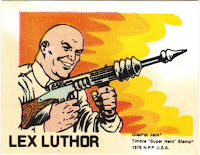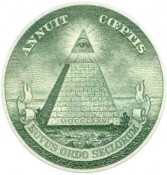A couple of years ago I found a book, The Illuminati by Larry Burkett. I picked it up at a garage sale or a library book sale or maybe it was just lying out on the street. It’s worn, heavily water-damaged, somewhat mildew-y and I thought that I would read it, you know, eventually. I grabbed it because I remembered that my college roommate had a copy and said it was one of the books that changed his life (these sorts of superlatives are common when you are a freshman in college). This, of course, is where this story starts to fall apart.
I finally started reading it this week. I’m almost 100 pages in and the basic premise is the existence of the Illuminati, known internally as The Society, which is largely composed of high level officials in every major government, economic and corporate entity worldwide in a vast net that somehow originated in the Middle East and evolved into the Druids in Europe (I’m thinking someone didn’t do too much historical research on this subject). The writing is mediocre at best, making me start to suspect that my roommate’s high school literary appreciation probably didn’t live up to my present expectations of a mind-blowing novel. In particular — and for no apparent reason — Christians, in the book, are targeted for exclusion, isolation and persecution. On the other hand, there are several mentions of “gay power” organizations’ rising influence.
 At first, I suspected the book was tongue-in-cheek. How could it not be with this subject, right? It seemed to be almost Dr. Strangelove-ian in its absurdity. The novel was first published in 1991, pre-dating the events that take place in the novel by only 10 years, but in many ways the book reads like it could have been written 20 years before that with how little the author understands some subjects…like the internet. The internet existed in 1991, albeit in a somewhat less-understood and less widely used form (at least by the general public), but he describes the “Data-Net” as being some revolutionary idea of a single prodigal student at Cal Tech who was able to link all the world’s computer networks through a stack of Cray computers which ran the entire network (anyone with a rudimentary understanding of networking and the internet will know that the internet does not need to be “powered” by anything other than individual client computers having access to the network via an internet service provider — yes, this was even the case in 1991).
At first, I suspected the book was tongue-in-cheek. How could it not be with this subject, right? It seemed to be almost Dr. Strangelove-ian in its absurdity. The novel was first published in 1991, pre-dating the events that take place in the novel by only 10 years, but in many ways the book reads like it could have been written 20 years before that with how little the author understands some subjects…like the internet. The internet existed in 1991, albeit in a somewhat less-understood and less widely used form (at least by the general public), but he describes the “Data-Net” as being some revolutionary idea of a single prodigal student at Cal Tech who was able to link all the world’s computer networks through a stack of Cray computers which ran the entire network (anyone with a rudimentary understanding of networking and the internet will know that the internet does not need to be “powered” by anything other than individual client computers having access to the network via an internet service provider — yes, this was even the case in 1991).
I was willing to forgive the technical glitches. I was willing to ignore, at least for a while, the complete lack of motivation in the religious persecution and hatred portrayed in the book — as if it was written without any understanding of how non-Christians might think (which, in fact, I suspect it was). I was even willing to put aside the lack of character depth — the novel bounces from one character to another without exploring any of them, and leaving each as a sort of half-drawn caricature of a person (the book is about things happening, I told myself, maybe it’s just not about people).
It wasn’t until I got to page 70 of the book that I started having serious doubts about it. On this page, it is describing the Leader of the Society, Amir Hussein who, among other things, is an arms dealer and destined to be the leader of the one-world government which is the single, over-riding goal of the Society. But Hussein’s personal motivations are somewhat more comical in their vast generality:
Hussein had but two passions in life: a deep hatred of Christians and Jews, and a total commitment to establishing Satan’s kingdom on earth.
…
 Say what? I seriously had to read that sentence three times to make sure it said what I thought it said. And then again to see if there was any trace of irony involved. This is the exact sort of over-simplification of internal dialogue, personal reflection and character motivation that Left Behind was guilty of and used to propel its half-baked characters. And, seriously? Who thinks to themselves “I am committed to establishing Satan’s kingdom on earth”?
Say what? I seriously had to read that sentence three times to make sure it said what I thought it said. And then again to see if there was any trace of irony involved. This is the exact sort of over-simplification of internal dialogue, personal reflection and character motivation that Left Behind was guilty of and used to propel its half-baked characters. And, seriously? Who thinks to themselves “I am committed to establishing Satan’s kingdom on earth”?
“Hey Tom, what’cha doin’ today?”
“Me? Oh, I’m just bringing Satan’s kingdom on earth. Gotta love that Satan, man!”
People don’t talk like that. Even if this was even a remotely conceivable thought in someone’s mind, it would be tangled up with other motivations and desires and probably would not be simplified as “bringing Satan’s kingdom on earth” unless they were a 14-year old who listens to too much Slayer. Even then, it would likely have nothing to do with Satan and, in fact, be more of a rebellious act of trying to establish one’s own sense of independence.
I kept reading, sure that it must’ve just been a fluke, and still assuming that this was the book my roommate swore by in college, when I ran into more ridiculous lines like:
Plus, he would be in a position to teach his archenemies, the Christians, a real lesson. God, how I hate them. No wait, he thought, not God…he didn’t believe in God. Anyway, I hate them, he concluded.
 Let’s look pasted the unprovoked hatred of the Christians for a minute and focus, instead, on one word: “archenemies”. An archenemy is something that can be found in comic books. It could possibly be applied to international politics if you were doing a really good job of stripping away decades of history and context. An archenemy is not something real people have.
Let’s look pasted the unprovoked hatred of the Christians for a minute and focus, instead, on one word: “archenemies”. An archenemy is something that can be found in comic books. It could possibly be applied to international politics if you were doing a really good job of stripping away decades of history and context. An archenemy is not something real people have.
Oh, and Larry? Atheists don’t think God, I hate them — oh wait, I don’t believe in God…
This morning I decided to look up Mr. Burkett and see if this novel would continue in this vein before I start reading it again.
It turns out that the book (actually a trilogy) that I was thinking of is, in fact, very different from the one that I am reading.
 The Illuminatus! Trilogy is by Robert Shea and Robert Anton Wilson, was written in 1975, is satirical, won some awards, and touches on Discordianism. The Illuminati is just a blip in a series of non-fiction works of an evangelical Christian author that otherwise is centered around finances and the economy that barely gets a mention on his wiki page. Two completely different things. One is good, and the other is now in the trash. The devil is…
The Illuminatus! Trilogy is by Robert Shea and Robert Anton Wilson, was written in 1975, is satirical, won some awards, and touches on Discordianism. The Illuminati is just a blip in a series of non-fiction works of an evangelical Christian author that otherwise is centered around finances and the economy that barely gets a mention on his wiki page. Two completely different things. One is good, and the other is now in the trash. The devil is…
I’m not even going to finish that statement.
[clear]


Leave a Reply